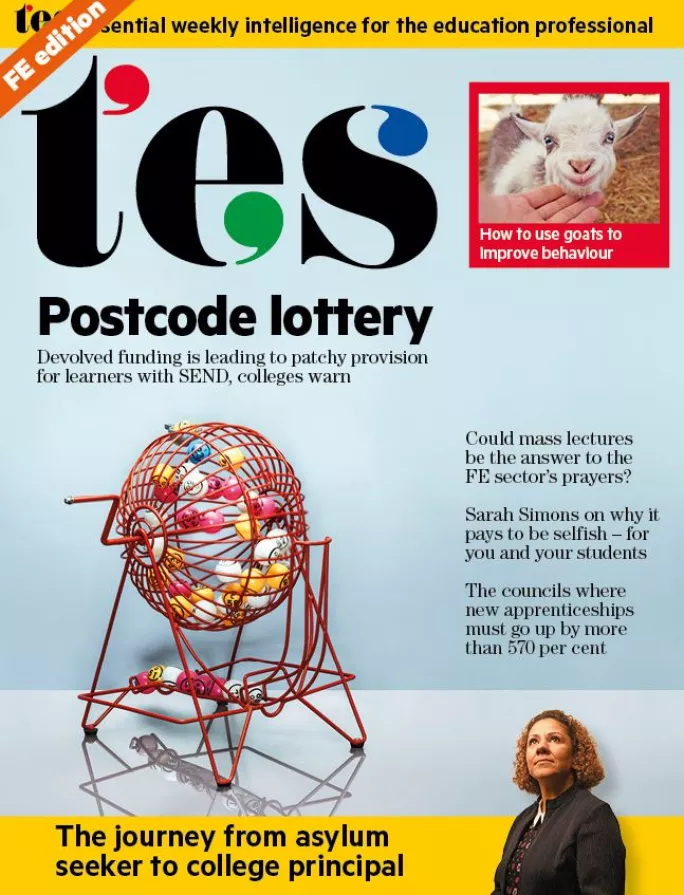- Home
- In this week’s TES Further: the journey from asylum seeker to college principal
In this week’s TES Further: the journey from asylum seeker to college principal

Asylum seeker to FE principal
In this week’s TES Further, reporter Will Martin interviews Saboohi Famili, principal of Epping Forest College and former asylum seeker (article free for subscribers). After inspecting Epping Forest College in November, Ofsted rated it “inadequate” in every category, highlighting continual changes in leadership and a “large-scale incident” - a brawl outside the college gates - during the inspection. But transforming a struggling college is no big deal for a woman who has made a new life after fleeing Iran’s oppressive regime.
In 1999, while visiting her father in hospital in the UK, Famili learned that her name had been given out as someone who had instigated unrest during Iran’s student protests. She applied for asylum, and enrolled as a student at Merton College (now South Thames College), after which she was offered a part-time position. Famili quickly rose through the ranks of FE and became a principal by the age of 35. Talking about her plans to transform Epping Forest College, Famili says: “There is no hiding place, there is openness and transparency about problems, and a good level of will and dedication to get it right.”
Devil in the detail on devolution
Ian Ashman, president of the Association of Colleges (AoC), writes that the devil is in the detail when it comes to skills devolution (article free for subscribers). Whether we like it or not, he says, devolution of the adult education budget to city regions is on its way in the next few years. It does have the potential to improve things, however, and the AoC has set up a network of colleges to share good practice and develop proposals on what needs to happen to make devolution work well.
TES reporter Julia Belgutay writes that providers have warned that the devolution of provision for learners with special educational needs and disabilities (SEND) has created a postcode lottery in the levels of funding and support offered by local authorities. The AoC is calling for additional government guidance to be published to clarify how funding for 16-25 learners is allocated.
More to life than Ofsted
FE editor Stephen Exley writes that there’s more to life than Ofsted. For colleges who have received an “inadequate” rating, there’s a tendency to “keep their heads down” and get their house in order. But they don’t have to accept their status as an educational pariah. As Garry Philips, principal of Ealing, Hammersmith and West London put it in a previous issue of TES (article free for subscribers), it’s more about have a “glass half-full” stance than donning rose-tinted glasses: “And it means that, rather than living in fear, we fully embrace the advice and knowledge that comes from the FE commissioner’s office.”
‘Lectures can set learners free’
Matt Bromley, an education leader and writer, argues that with the emergence and popularity of YouTube and TED Talks, lectures can setting learning free - meaning the format is ripe for revival (article free for subscribers). As greater efficiency in the sector becomes ever-more important, perhaps it’s time to revive the humble lecture, which offers a means of teaching large groups of learners with fewer staff and at a lower cost. “As well as being cost-effective, lectures - as opposed to classroom-based sessions and tutorials - are also a good use of precious learning space, enabling colleges to reduce the cost of their estate,” he says.
Be selfish
TES columnist Sarah Simons says FE staff should put themselves first because being selfish is a responsibility (article free for subscribers). “If you find yourself regularly working a 50-, 60-, 70-hour week when your contract says 37 hours, say no. If you know that the increased demands are having an impact on your health, say no. If you don’t feel valued, respected and heard, say no.”
Apprenticeship strain
FErret reveals that London boroughs are feeling the strain from the apprenticeships and skills minister Robert Halfon’s target of creating an additional 200,000 apprenticeships in public sector organisations by 2020 (article free for subscribers). Lobby group London Councils claims that the boroughs, which have created an average of 690 apprenticeships per year since 2009, will be burdened with collectively delivering 4,674 per year - a target that the group’s chief executive Peter John calls “completely unrealistic”.
All this and much more in this week’s TES Further

Want to keep up with the latest education news and opinion? Follow TES FE News on Twitter, like us on Facebook and follow us on LinkedIn
Keep reading for just £1 per month
You've reached your limit of free articles this month. Subscribe for £1 per month for three months and get:
- Unlimited access to all Tes magazine content
- Exclusive subscriber-only stories
- Award-winning email newsletters



